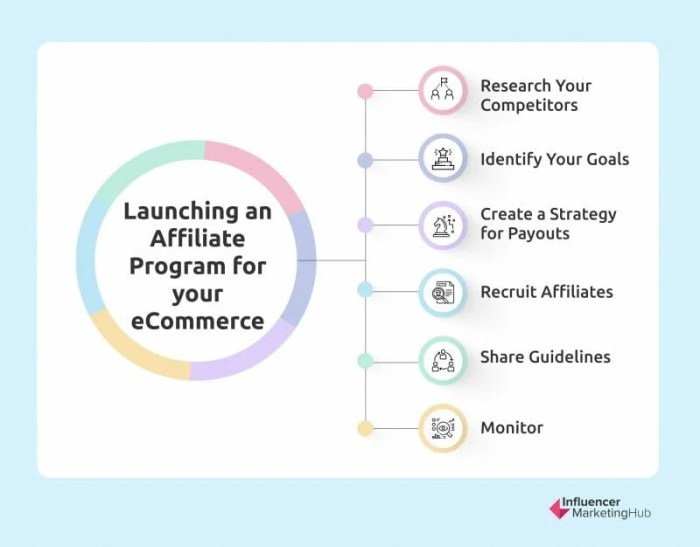Kicking off with Using Affiliate Marketing for E-commerce, this opening paragraph is designed to captivate and engage the readers, setting the tone american high school hip style that unfolds with each word.
Affiliate marketing is the secret sauce for many successful online businesses, driving sales and increasing brand exposure in a cool and savvy way. Get ready to dive into the world of affiliate marketing and revolutionize your e-commerce game!
Introduction to Affiliate Marketing in E-commerce: Using Affiliate Marketing For E-commerce

Affiliate marketing in e-commerce is a strategy where online businesses partner with affiliates to promote their products or services. Affiliates earn a commission for each sale or lead generated through their unique affiliate link. This form of marketing allows businesses to expand their reach and increase sales without upfront costs for advertising.
How Affiliate Marketing Works for Online Businesses
Affiliate marketing works by businesses providing affiliates with a unique tracking link. Affiliates then promote the products or services through various channels such as websites, social media, or email marketing. When a customer clicks on the affiliate link and makes a purchase, the affiliate earns a commission. This performance-based model incentivizes affiliates to drive traffic and sales for the business.
Examples of Successful E-commerce Websites Using Affiliate Marketing
- Amazon Associates: Amazon’s affiliate program allows individuals to earn commissions by promoting Amazon products on their websites or blogs.
- Rakuten Marketing: Rakuten offers a comprehensive affiliate network for businesses to connect with publishers and influencers to promote their products.
- Shopify Affiliate Program: Shopify’s program enables affiliates to earn commissions by referring new customers to the e-commerce platform.
Benefits of Using Affiliate Marketing for E-commerce

Affiliate marketing offers a plethora of advantages when integrated into e-commerce strategies. It serves as a powerful tool to increase sales, enhance brand exposure, and drive traffic to e-commerce websites.
Increased Sales and Brand Exposure
Affiliate marketing enables e-commerce businesses to tap into a wider audience through the network of affiliates. These affiliates promote the products or services to their own followers or subscribers, leading to increased sales and brand exposure. By leveraging the reach of affiliates, e-commerce businesses can expand their customer base and generate more revenue.
Driving Traffic to E-commerce Websites
Affiliate marketing acts as a catalyst for driving traffic to e-commerce websites. Affiliates use various marketing channels such as social media, blogs, and email newsletters to promote products or services. This influx of referral traffic not only boosts website visits but also increases the likelihood of converting visitors into customers. Additionally, affiliate marketing helps improve search engine rankings through backlinks from affiliate websites, further enhancing visibility and attracting organic traffic.
Strategies for Implementing Affiliate Marketing in E-commerce
Implementing affiliate marketing in e-commerce requires careful planning and execution to ensure success. Here are some key strategies to consider:
Different Strategies for Setting Up an Affiliate Marketing Program
- Choose the right affiliate network: Research and select a reputable affiliate network that aligns with your e-commerce business goals and target audience.
- Create compelling commission structures: Offer competitive commission rates to attract quality affiliates who will be motivated to promote your products.
- Provide promotional materials: Equip your affiliates with high-quality marketing materials such as banners, product images, and text links to help them effectively promote your products.
- Monitor and optimize performance: Continuously track the performance of your affiliate marketing program and make adjustments as needed to improve results.
Importance of Selecting the Right Affiliates for E-commerce Businesses, Using Affiliate Marketing for E-commerce
- Relevance: Choose affiliates whose content and audience align with your e-commerce products to ensure maximum impact and conversions.
- Credibility: Select affiliates with a strong reputation and following in your industry to build trust with potential customers.
- Engagement: Partner with affiliates who are passionate about your products and can create authentic, engaging content that resonates with their audience.
- Diversity: Consider working with a mix of affiliates, including influencers, bloggers, and niche websites, to reach a wide range of potential customers.
Tips on Creating Engaging Affiliate Marketing Content for E-commerce Products
- Focus on storytelling: Craft compelling narratives around your products to captivate audiences and drive interest in making a purchase.
- Highlight benefits: Clearly Artikel the unique selling points and benefits of your products to showcase their value to potential customers.
- Use visuals: Incorporate high-quality images and videos to enhance the visual appeal of your affiliate marketing content and showcase products in action.
- Include calls-to-action: Prompt viewers to take action by including clear and persuasive calls-to-action that encourage them to click through and make a purchase.
Tracking and Analyzing Affiliate Marketing Performance
When it comes to affiliate marketing in e-commerce, tracking and analyzing performance is crucial to understanding what’s working and what needs improvement. This data-driven approach helps optimize strategies for maximum results.
Tools and Methods for Tracking Affiliate Marketing Performance
- Use affiliate tracking software: Platforms like Google Analytics, AffiliateWP, or Refersion provide insights into clicks, conversions, and sales generated by affiliates.
- Unique affiliate links: Assigning unique tracking links to each affiliate helps monitor individual performance and attribute sales accurately.
- Conversion tracking: Implementing conversion tracking pixels or codes on the thank you page can track successful conversions back to specific affiliates.
Key Metrics to Analyze Affiliate Marketing Success
- Conversion rate: Measure the percentage of clicks that result in a sale to gauge the effectiveness of affiliate campaigns.
- Average order value: Analyze the average amount spent per order from affiliate-referred customers to assess the quality of traffic driven.
- Return on investment (ROI): Calculate the revenue generated compared to the cost of running affiliate campaigns to ensure profitability.
Tips for Optimizing Affiliate Marketing Strategies based on Performance Data
- Identify top-performing affiliates: Focus on building strong relationships with affiliates who drive the most sales and consider offering them special incentives.
- Experiment with different commission structures: Test varying commission rates or performance-based incentives to motivate affiliates and improve results.
- Regularly review and adjust strategies: Continuously monitor performance metrics and make data-driven decisions to refine affiliate marketing tactics for better outcomes.